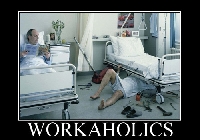How much should you work?
By Catalogs Editorial Staff

How much should you work? Enough but not so much that it is going to kill you
For some people, work is primarily a means to pay their bills. However, for others their job is first and foremost in their lives and they would be lost without it. It gives them a purpose and an identity. The paying-the-bills part is secondary to them.
How much should you work?
Reasons for work
Some people don’t know when to stop. With the influx of state-of-the-art technology, keeping people connected at all times, individuals are on the clock more than ever before. Normally they would spend time with their family and friends, but instead are texting or doing business on their cell phones or glued to their laptops.
Frequently, someone at a social event excuses himself to take a job-related phone call or make one.
The danger of being consumed by one’s job is not taking the time to address one’s home life and the needs of the family or the person’s own non-job related needs.
A study showed employees and bosses claim to be overwhelmed and over-worked yet admit cheating themselves out of leisure time by doing job-related things when they are off the clock.
~
Fear can motivate a person to spend too much time on the job. The woman who fears she will be replaced at her job or lose her position chooses not to take full maternity leave. She is depriving herself of invaluable and irreplaceable time spent with her newborn infant. Her job has become more important than her child and her own personal needs as a new mother. Sometimes it cannot be helped: She has to return to her job ASAP because she needs the money to support herself and her child.
Some bosses and employees believe they are indispensable and the business will collapse in their absence. Bosses may find leadership occurs when they are NOT on the premises, rather than the other way around.
Many people find their identity in their job. When they aren’t actively working, or if they lose their position, they lose their identify. Work is their life.
Work-Life Balance
The fact is, those who do get away from their jobs on a regular basis are better employees (and bosses) than those that don’t. They are more accurate, safer in their job practices and stay with a company longer than those tied to a desk.
When a company establishes a ‘use it or lose it’ vacation policy this is wise because it forces workaholics to take time off. Even though the workaholic may not realize vacation time benefits him, it does, and it ultimately benefits the company that employs him.
The Workaholic
This person is obsessed with never-ending activity related to employment. Over-working leads to physical and mental damage but try to convince the person of this because he thrives on the praise he receives as a result of his ceaseless functioning when it comes to the job.
The downside of this kind of obsessiveness is heart disease, anxiety, sleep disorders, substance abuse and destroyed relationships. Many end up divorced or miss their children’s youth altogether.
Some submerse themselves in their career as a way of avoiding a bad marriage or home life or to fill some other void in their life. When not on the job, they experience a sense of loss and are at loose ends.
Those who do not approach their jobs in this way know how to set boundaries and keep balance in their life, which is a healthy attitude.
Ironically, the person that is on the job excessively does not necessarily accomplish more than the person who sticks to regular hours. He is often fanatical about minutiae and as a result finds it difficult to move on to the next undertaking. The person may be looking for a way to generate more work rather than trying to be efficient.
The impact this individual has on others, particularly if he is the boss, is bad because he unreasonably expects others to be as obsessed as he is. He gets a kick out of never-ending work but the others in his employ don’t.
Popular Savings Offers




.jpg)



.png)

.png)
.png)